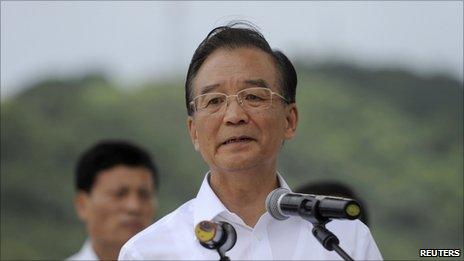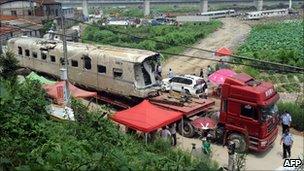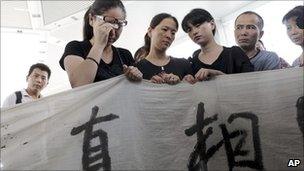China's 'Grandpa Wen' seeks to soothe crash tension
- Published

Chinese Premier Wen Jiabao vowed a thorough investigation into the crash
As the dozens of journalists burst through the blue ticker tape sealing off the train crash site, some plain-clothed officials were caught unaware.
They were still arranging the flowers under the viaduct.
It was the spot where several train carriages had plummeted off the bridge.
The wreckage has all been removed. Apart from the bouquets of flowers and the freshly laid gravel, there was little evidence that anything had gone wrong here.
According to the authorities, normal service has resumed - you could hear and see the trains overhead.
But this crash in Wenzhou has called into question the future of the country's high-speed rail network.
It has also created a deep sense of mistrust between the authorities and the people.
'Personal touch'
And so the visit of Premier Wen Jiabao.

At least 39 people died and dozens were wounded in the crash
He is often referred to as Grandpa Wen - the soft, paternal face of the party.
He is blessed with the personal touch, the caring words, in short, a politician who can connect with the public.
So in the times of crisis - like this one - Grandpa Wen is called upon to soothe the nation's nerves.
Standing in his white shirt, his vest clearly visible underneath, he apologised for not coming to the crash site sooner. He said he had been ill in hospital.
He paid his respects to the victims, bowing three times over the flowers.
He said that safety, not the speed of the trains, would be the priority of his government.
The repercussions from this crash have been felt across China.
The accident has been widely discussed - and debated - on state TV, which is highly unusual here. Criticism of the authorities handling of the issue has been fierce.
The crash has come to symbolise the corrosive effects of corruption - where safety standards are compromised to ensure kick-backs.
Demanding answers
Allegations of a cover-up after one of the carriages was buried at the crash site - apparently to hide the evidence - have been denied by the authorities.

Relatives are calling for a full investigation
They now say the crash was caused by a severe design flaw in the railway's signalling equipment.
Chinese companies were hoping to sell their technology abroad but those plans are now in jeopardy.
In the days following the crash, relatives of those killed or injured gathered at hospitals and some cases the mortuary to demand answers.
Wang Hui, 32, lost her husband. He was a factory owner who was rushing back home in order to go on holiday the next day.
Zheng Hangzheng never made it. He leaves a widow and a one-year-old daughter.
His wife says she felt real anger following the crash. "I need to know the truth," she said.
But watching Wen Jiabao's press conference on television, Ms Wang felt comforted, believing that justice will be done.
China is spending hundreds of billions of dollars on its high-speed rail network - it's already the biggest in the world.
But what was meant to be a project of national pride has, for now, become a source of mistrust and anger.
- Published28 July 2011
- Published28 July 2011
- Published25 July 2011
- Published24 July 2011
- Published24 July 2011
- Published23 March 2011